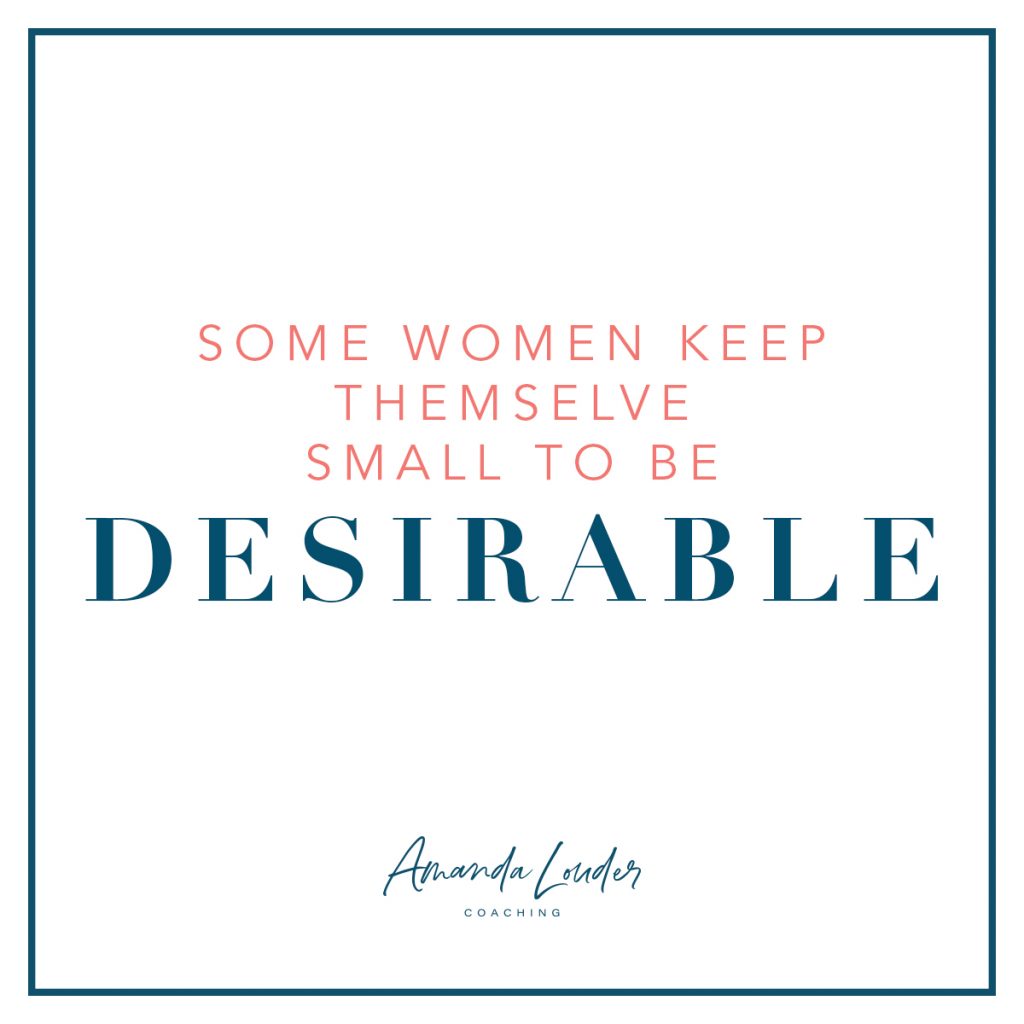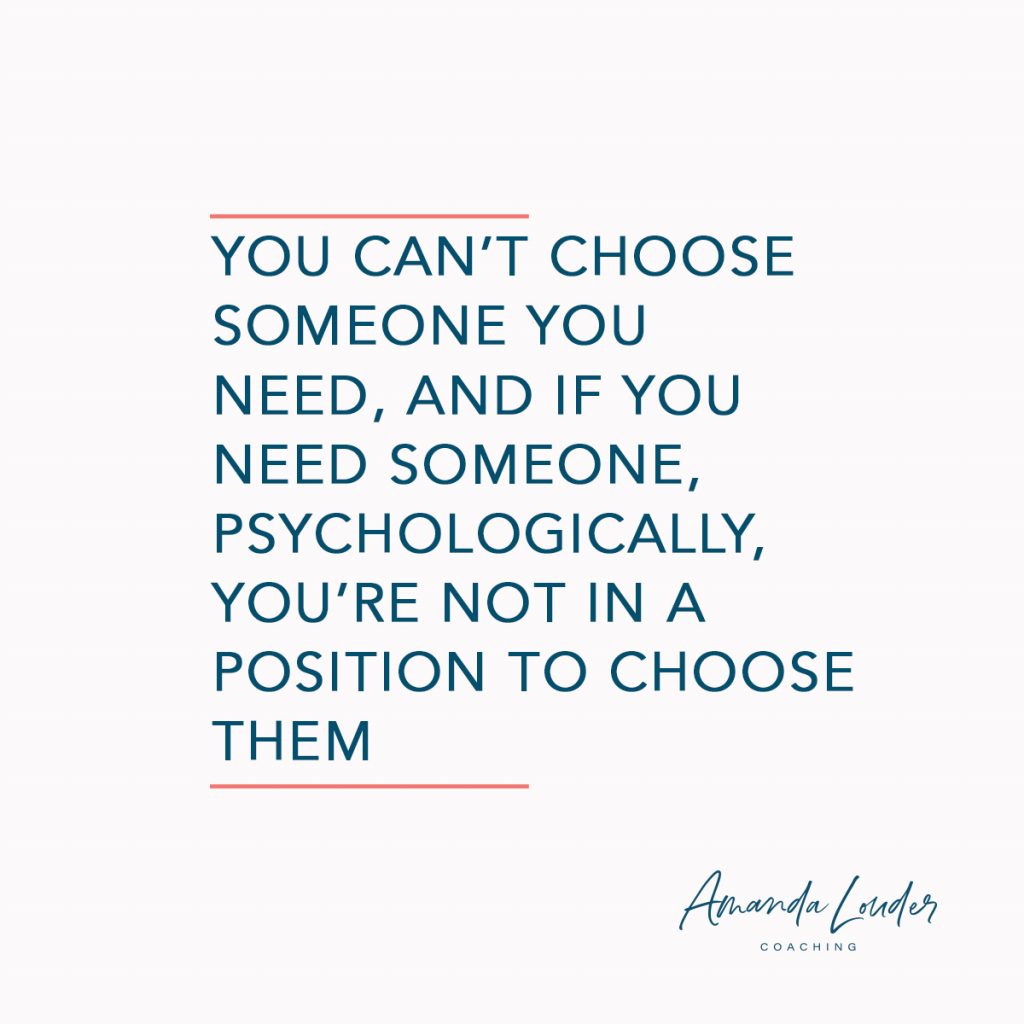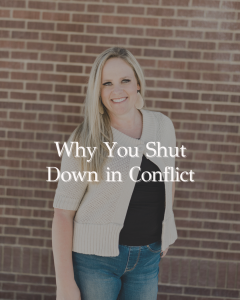
In this episode, I’m speaking with Dr. Jennifer Finlayson-Fife about equality in marriage. This is something that is ingrained in our culture but can be really detrimental to our marriages. We want partnership marriages but to have a partnership marriage, we need to be partners in all aspects of our lives. We discuss how to reframe those ideals we were raised with in order to have the best marriage possible.




Show Notes:
Follow Amanda on Facebook and Instagram.
Join Amanda’s Private Facebook Group.
References for this episode:
Dr. Jennifer Finlayson-Fife is an LDS relationship and sexuality coach as well as a Licensed Clinical Professional Counselor in the state of Illinois. She has a Ph.D. in Counseling Psychology. Her teaching and coaching focus on helping LDS individuals and couples achieve greater satisfaction and passion in their emotional and sexual relationships.
In addition to consultation with couples and individuals (in-person and online), she teaches online relationship and sexuality courses designed to foster self and sexual development and create happier relationships and individuals. Dr. Finlayson-Fife also offers many live workshops and retreats for couples and individuals.
Jennifer is a frequent guest on LDS-themed podcasts and writes articles for LDS-themed blogs and magazines, on the subjects of sexuality, relationships, mental health, and faith.
Find her on Instgram: @finlaysonfife
Show Summary:
Welcome to the podcast everyone. I am so excited to have you here today. I have an amazing interview that I can’t wait for you to hear, but first I want to let you know that I am going to be holding my free class, “How sex can be for you” in the coming weeks. And if you want to register for this free class, it’s going to be so awesome.
I have some great bonuses and freebies for you.
You can go to my website, www.amanda lauder.com/freeclass to register.
The webinars will be held on zoom on Wednesday, August 4th at 10:00 AM and again on Thursday, August 5th at 2:00 PM. So when you go to the website, you can pick either one of those times and register for that class, show up live, get involved, and be ready to type into the Q&A box and let me know your experience so that I can help you directly on that call.
I am so excited to be hosting this class again, because it was phenomenal. The last couple of times that I hosted and I want to make sure that everybody has a chance to be in this free class if you want to be.
So again, go to my website, www.amandalouder.com/freeclass.
All right, let’s get to this amazing interview with Dr. Jennifer Finlayson-Fife.
If you are not familiar with her, she’s absolutely amazing. I found her work abou four years ago and have been studying her work and incorporating a lot of the ideas and things that she taught into my coaching because she is just so brilliant.
So I absolutely loved having her on the podcast to share with you some really important pieces to learning more about equality in marriage. So let’s get to the interview.
Amanda: Welcome to the Sex for Saints podcast, Dr. Finlayson-Fife. I am so excited to have you on the podcast. If there are listeners that don’t know who you are and have been living under a rock for the last few years, could you introduce yourself to them please?
Jennifer: Sure, I’m Jennifer Finlayson-Fife and I live in the Chicago area and I’m a licensed therapist and a coach and instructor. And I work mostly with Latter-day Saint individuals and couples around relationship and sexuality issues. So I do a lot of teaching on that and one-on-one instruction as well.
Amanda: Awesome. And you’ll find that many of the concepts that I teach here on the podcast are ones that I’ve learned either from Dr. Finlayson-Fife or through her from Dr. Schnarch. You’ve introduced me to a lot of concepts that I use a lot with my clients and here on the podcast. I’m sure that they’ll be familiar with some of your work if they haven’t already listened to you, then through me, because I love your stuff.
So I wanted to bring on the podcast to talk about the concept of equality in marriage and specifically in the sexual relationship. I’ve heard you talk on the One Up, One Down dynamic. Could you explain what that is?
Jennifer: Sure. Do you want the long lesson or the short one? I’ll see if I can get some more in the middle.
So human beings, and this is a lot of Murray Bowen’s work, David Schnarch’s work, but also Adler’s work. There’s a lot of different theorists who have talked about this idea that when we are trying to manage our anxiety, the anxiety that’s inherent to being alive, we tend to do it in relation to other people, and in fact, use our way of relating to handle anxiety about ourselves.
One of the very typical human patterns is to create hierarchies in relationships. And they’re both dependent positions. They’re both weak positions. One Up will look stronger than One Down.
And so a lot of people in marriage, in friendships, in any important relationship, but even unimportant relationships, will instinctively create these hierarchies either to fold into a dominant others’ life, which is a way of hiding from the basic responsibility of living, and a fantasy that someone else is going to take care of you or show you the way or make your life legitimate.
Or the One Up position, which is in order for me to feel strong or important or valuable, I want someone to fold into my life, to reinforce me, to be the backup of my reality. And a lot of times those two people get married. And this is definitely because they think, Oh, perfect. We fit each other’s fantasies.
And this is also traditional marriage, or a lot of times what we idealize is the right kind of marriage. That the man is the “strong one”, the “dominant one” and the woman is there to be the support staff for his important work.
And we’ve done this around sexuality, which is that men’s sexuality is the real sexuality. A lot of women that I work with have grown up being taught that idea that women are there to service their men’s sexuality to give them the sex he “needs” so that he doesn’t stray, so that he doesn’t become unfaithful. It’s the payment to him for the security that he provides financially and otherwise.
So while that has an instinctive appeal, when we are immature, it is antithetical to intimacy in marriage and is antithetical to good passionate sex. And that surprises a lot of people.
Amanda: So explain more about that. Why is it antithetical to a great sexual relations?
Jennifer: Because you can’t choose someone you need, and if you need someone psychologically, you’re not in a position to choose them. And passion in its core is about choice and freedom, not about obligation and entanglement.
And so a lot of people get married and create out of a fantasy of security, a kind of entanglement. He needs me, she needs me, but it is exactly the strictures that limit the sense of passion and openness and freedom to be knowable, a real sense of choice in marriage is interfered with by that psychological neediness.
Amanda: So can you give us a few examples of what that might look like?
Jennifer: Sure. Good question. So, a typical client might be like the woman who grew up in a man’s world. In her family, thinking that men are it. That being a good woman is to fold into a man’s life. She doesn’t get much of a career of her own. She doesn’t have a strong sense that she can or ought to provide for herself. She may even compromise her development to be a desirable woman because she doesn’t want to be a threat to a man and his sense of strong, his sense of dominance.
I worried about that myself, that I was in fact, making myself less desirable if I were to pursue a PhD because in the world I grew up, there were plenty of men who were calling me to repentance around that.
Some women actually keep themselves small to be desirable.
And of course only a weak man needs a woman to be weak to feel strong. Strong men don’t need women to lessen themselves for them to embody their strengths.
So just to be clear about that, but that’s the kind of idea. So that woman then feels like, well, I’m supposed to be dependent if I’m a good woman and I also doubt that it’s okay for me to strive on my own. Maybe I won’t get the love that I want if I do, but also maybe I don’t have the capacity. Like maybe if you’ve grown up in that idea, then you might think, well, maybe I shouldn’t and maybe I couldn’t. So that woman is often looking for a caretaker in a husband.
Now this is like, so culturally dictated in any kind of traditional culture. So this is not shocking at all. In fact, a lot of people think she’s doing exactly what she ought to do.
The man is given the idea to be a man is to be strong, to be the leader. To provide for a woman and children. Basically there’s a hierarchy, God man, woman, children.
So you’ve got to be the able one, the one who doesn’t get emotional, the one who doesn’t feel insecure, the one who’s got it all together, who understands second. And the reward for all, this is good sex, right?
He thinks she is going to love me and desire me and want me because I’m so awesome. And a lot of times they are pretty awesome. The men I’ve worked with are doing good things in the world, but they’re not getting the admiration and desire because that man though often is not very real.
That is to say he has hidden from himself and his partner his vulnerabilities, his insecurities, his anxieties about sex. A lot of times we’re like, it was fine to say women have sexual anxieties, but not that men do, even though all of men’s difficulties with pornography and difficulty with intimacy or initiating sex or showing who they are is about men’s version of sexual anxiety.
So the reason this breaks down is because from the “strong position”, you’re not allowed to be human. You’re not allowed to have any insecurities. You’re allowed in that frame to have legitimate sexual needs, but you’re not supposed to have emotional needs.
You’re not supposed to be a flawed person. You have to kind of over-function and pretend to have that kind of over functioning that is antithetical to intimacy because intimacy is to be real and to be collaborative and to partner with somebody, not caretake. Partnership marriages are different from caretaking marriages.
So he’s bringing a half self. The woman often feels that he can be resentful when he’s not getting the admiration he thinks he deserves. He’s not getting the woman who is just yielding and folding into his life the way he wants her to. This is just one character. This happens in a lot of different ways.
So he will often feel resentment and anger. “I’m giving you all this, but you don’t gratify me. You don’t desire me, even though I’m so desirable. And there are all these people at work who would think I’m desirable and you don’t.”
And that’s often true because he often looks really good on the surface and might get the validation of other women, but not get his wife’s validation.
Now, she’s not giving a lot of validation because first of all, she feels condescended to. She feels like she doesn’t really have a lot of control. She kind of has to be there. She doesn’t really have the ability to leave. She needs to live life on his terms, which quickly people start to resent. There’s a safety in it, but then you start feeling like “I’m disappearing in this marriage.” Who am I? What is my life about? I don’t want to just prop this guy up for life. And I don’t want to prop him up sexually for life either. In fact, that usually falls apart before the honeymoon’s over. Because it’s so intimate. Nobody wants to be servicing in an intimate way.
And so the resentment is because you both want the dependency. You bought into it, but the resentment around it is right there in the shadows and undermining desire.
The husband thinks, “Well you get to be superior, but I don’t want to give you good sex. And you get that too.”
This is a way of having and retaining a certain part of myself in the marriage. It’s also maybe a way of getting back at you for your condescension. I don’t want to validate your condescension by giving you good sex.
Often women don’t even have contact with their desires because they’ve learned to be desireless so it can break down for that reason as well.
Amanda: And I’ve heard you talk a little bit about how some women even put themselves into One Up position in this part, because they think they’re better than their spouse for not giving in to those sexual desires.
Jennifer: Yes, exactly. So there’s a lot of ways people can create hierarchies and it’s not just men on top, women on the button. Women can get into a covert. I’ll give you a couple of versions, but one is the way you were saying. I’m on this pedestal and you, loser, have all these hedonistic desires. And so it’s a sort of spiritual hierarchy.
We do this in church a lot. Women are so special and pure and right there next to God and then there are these men, and that’s a very tempting narrative if you have sexual anxiety. I think it’s even tempting for some men to pedestalize their wives as a way of not dealing with and reconciling their own sexuality.
But another way that hierarchies can happen in this. You control from the bottom.
So I’m needy, I’m depressed. I’m anxious. I’m so glad you’re not one of those natural men that want sex all the time. So you can control from weakness too, you know.
A baby has the most control in a household because they need the most, and some people stay in that dependent position as a way of getting control over the family system.
Amanda: That’s a great analogy with the baby, because that totally does happen,
So how do you think this narrative plays into the priesthood, him being the leader in the home. How does that dynamic fit into this?
Jennifer: Well, it infuses LDS marriages with this hierarchy. Because, in my opinion, if you’re going to say priesthood is you’re doing certain roles and women are doing other roles, but both have authoritative access, both have the ability to operate as equal voices, then no problem. It doesn’t matter in my view, if men do some things and women do other important things, but for me, the issue is of authority. If a man’s position instinctively trumps a woman’s, you can’t have a partnership marriage.
And so we talk about women have access to the Spirit and they have all these things, that’s fine. And you don’t even have to call it priesthood as long as they’re equal.
I remember as a younger person thinking, Wait, it doesn’t make any sense. How do you just defer to a man if he’s deferring to God, because if you already know what God’s will is, why do you need to defer to the man? How do you know if he is deferring? If you don’t know God’s will. So I’m like, he’s just the middleman. If you already know God’s will, then you have the ability to discern for yourself.
It’s a traditional system that we haven’t fully grown out of and that we need to grow out of if marriages are really going to thrive. If, as a society, as a collective, we’re going to thrive because you can’t be dismissive of a part and have the body thrive.
Amanda: I totally agree. I was married before, and it was a pretty abusive marriage and this dynamic came in a lot in a lot of different areas. And you know, it really bothered me, saying that I needed to defer to my husband, with certain things. When I knew that it was not what I should be doing.
And so really, teaching women, which is my passion, to really step into their own power and have their own connection with God and then equally doing that with their husband so that we’re not creating this power dynamic, just because he has the authority of the priesthood doesn’t mean that your say is any less than his.
Jennifer: That’s a really fundamental and important point and you can’t create partnership without that fundamental understanding. People have to be psychological equals. Again, you can be doing different roles.
One can be bread-winning. One can be home with the kids, but in my dissertation research, the women who really thrived sexually in their transition into marriage had a full sense of equality within themselves. Not just how they related to the law of chastity, but how they related to their own desires. And even if they were in traditional roles, they didn’t question whether or not they were really on equal footing with their spouse, nor did their spouse question it. It was a shared assumption.
Amanda: In my current marriage, that is a completely different dynamic because we both have different roles, but we’re both fully ourselves and independent and we’re just choosing to be together. It’s not because we need each other, one person does more than the other. And he is just as involved in raising the children and the household chores as I am because we both work.
It’s much more equal and it’s so much better. It’s so much better when it’s like that when we just get to choose each other, rather than like this need and security and stuff like that.
Jennifer: Just to validate that point, a lot of times, I remember hearing at BYU, I was there in like the late eighties, that if you marry them young, you can train them the way you want. That was a horrifying idea that I heard some men say.
Amanda: Which I, I totally ascribed to when I was there. I was married nine days after I turned 19.
Jennifer: So you would think if that were true, you’d still be married. Or the idea that if you marry them young, they’re not going to get all feminist, and independent and all this stuff.
The research shows though, the later a woman marries and the more educated she is, the less likely she is to divorce, which is the opposite of this kind of push them into a dependent position because then they won’t go.
If a woman knows she can leave, that’s what gives her the freedom to really embrace and enjoy her marriage because it is a choice, not a prison.
Amanda: Absolutely. I wholeheartedly agree with that. So kind of along those same lines of priesthood and stuff, it may not be as prevalent in the Latter-Day Saint culture, but in the Christian culture, that feeling of being the submissive wife. Is that the same or is it different?
Jennifer: I think there’s probably a way that one can think about submission in a positive sense, but the submissive wife is the same idea. It’s the idea that God and the man are together. And if you’re going to be a good woman, yield to the man. That basically you are a dependent, get used to it and be a good one. Be a good dependent, be a grateful dependent. That’s the teaching.
Can some people get through life and do that? I’m sure they can. I’m sure they do.
Does it work for the production of family? Yes, it does. If the goal is having children and you want to set up that kind of hierarchy, and each of your respective roles and there is an inherent and understandable dependency. I know a lot of people get through life and do it that way.
Even in fundamentalist Islam. I studied with a Muslim woman when I was studying abroad in Israel, back in the early nineties. And one of the things that I really learned in that class was how Muslim women would find covert ways of getting control. So even though ostensively they’re in a hierarchy, the ones who really control the family ultimately is the woman and the woman with lots of sons because the daughter-in-law and the son defer to the mother ultimately now in the marriage, she’s under the man. But she gets a hold of the whole family.
So kind of that My Big Fat Greek Wedding idea that the man is the head, but the woman is the mech and she can turn the head.
The women are not idiots. And even in these traditional settings, they find their ways to get control. So I think it surprises a lot of men in traditional settings. The idea that women don’t have control, because I think a lot of them do feel controlled.
And fairly! We want our agency and our power. Nobody wants to genuinely submit their life to another mind. But unless you’re mentally unwell.
Amanda: Don’t you think that that is completely again, antithetical to the purpose that we have here on this earth. To become our highest selves, to become more like God.
Jennifer: Exactly. I think it’s a perversion of archeology. I mean, it’s a tempting one. It’s one that people like, and they like to promote because it justifies their life or it justifies their unhappiness. Can you produce a family in it? Yes. If that’s your goal, but an intimate marriage, a partnership marriage, a sexually thriving marriage. It doesn’t work.
And so you have to think about what marriage have I bought into implicitly or explicitly. And is it what I really want? Because I think a lot of men are also really hurting and disillusioned. They’re also doing what they were taught to do. It’s not like, oh, great. I get to control a woman for life. I don’t know many men who thought that way.
It’s more, the way they were taught. This is what it is to be a man. And these are the assumptions of what your rewards will be for falling in line.
But a lot of men are hurting. Never feel wanted, never feel desired. Feel anxious about their sexuality, handle it sometimes in destructive ways, but are not benefiting from this hierarchical system at all.
Amanda: So when I was first introduced to this concept, I was discussing it with a friend of mine and she was telling me that in her marriage, this One Up One Down, showed up a lot with money. That she felt she had to ask permission to spend money and get her husband’s approval. And it wasn’t just her putting her in this one down position. He did it too. He thought because he earned the money, she was expected to ask permission, but yet he would go spend large amounts of money without ever talking to her about it.
So she’s like, okay, I’m going to make some changes here. This is not okay with me anymore.
And oh, it caused a lot of problems. So what would you recommend to a couple who’s dynamic has always been this way, that really don’t want it to be that way any more or even one person really doesn’t want it to be that way anymore.
Jennifer: I think it’s really a very important point.
And this issue of money says a lot about who has the most power in the marriage is who’s spending the money. And how is the money thought about right. And meaning it’s not, who’s spending the money. That’s not quite the right way to say it, but whose wishes are getting met most around the economics.
Does each person have a sense of freedom to have what they want, whether that’s to save or whether that’s to have nice things? A collaborative marriage is going to be collaborative. A partnership marriage is going to partner around money and there’s a lot of different ways that people do this.
But one of the working assumptions I have is in a marriage, the money is shared. It doesn’t matter who’s making it. Legally it’s shared.
Amanda: If you’re going to get divorced, it’s going to be split 50/50 away.
Jennifer: Exactly! So it doesn’t matter who made it. And this idea that I made the money, therefore I get a bigger vote is doing damage to a marriage.
Now, not only do you have equal access, but you have equal responsibility because there’s a lot of people who are like, Hey, Jennifer said, I get equal access, but I’m not going to be responsible. I can spend it however I want. And I think that’s also a perversion. It’s not about getting it from your husband and now you can do what you want. It’s about how do we really create a reality around our money that’s a fair representation of who we each are and what we each want.
In our family, we spend more than my husband likes and we save more than I like. That is to say, what can we both be at peace with, and what does that look like? And that takes some negotiation from a shared foundational reality.
One other way that couples handle this well, is that we agree on what our expenses are, we agree on kind of the framing and then we each have disposable income that’s equal that doesn’t have to be accounted for to anyone. This is the amount that you can do whatever you want with it.
And, even if your spouse thinks you don’t need another pair of shoes, you don’t have to justify that. But you each have that and you can do with it what you want. And if you want to save it, you can save it. So that’s just another way. But I think that this idea of really sharing around that is important.
I worked with a couple where he made a lot of money, had the PhD, she had done it in the traditional way, had a year or two of school under her belt. And she just had this basic sense that she couldn’t really leave him because there would be this fight for the money and she would never get it.
And even though he would say, Listen, I am not going to withhold anything. I would not do that to you. And I think it was true. She just kind of always had this feeling that she was trapped, that she couldn’t leave if she wanted. So they set up an agreement in the marriage that if she were to leave, she would get half.
And this psychologically released her from this fear or this feeling of entrapment. It actually just helped her realize that she had real choices and it actually helped her take more responsibility for herself and her life. She couldn’t hide behind, I’m a victim of the marriage anymore. She started going back to school, started doing lots of things, just kind of stepping into an adult position, but that explicit negotiation was helpful for her.
Amanda: That’s interesting. I like that. We do the prenuptial agreement. This was kind of like a mid nuptial agreement. When it comes to it, we all have a prenuptial agreement. It’s just, if we don’t set it up ahead of time, it’s whatever the state says it’s going to be.
I love that because I mean, having been through a divorce myself, I understand that dynamic. I felt trapped because he had a master’s degree and I had two years of college and I mean, I’m pretty knowledgeable. I’d had several businesses and stuff, but I figured I’d make it on my own. And so for a long time, I was kind of trapped in this marriage where I can’t leave because I don’t know how I’m going to survive.
But really it’s coming into yourself and saying, this is who I am, and this is who I want to be and nobody’s going to stop me.
And I think as women, sometimes we value that safety and security more than equality. And I think that gets in the way of our own personal development. What do you think about that?
Jennifer: I think that might be true. There’s a socialized aspect of it. I think there’s probably a biological part too where if you’re going to reproduce and you’re trying to keep your offspring alive, we’re probably pretty wired up for wanting security and safety and dependency is necessary to just be able to do that all hands on deck, work of raising up very young offspring.
So I think both a social and a biological tendency to highly favor that and I think that’s okay. I mean, what I mean is there’s probably some situations in which as much as you want that it isn’t okay. And that you have to move forward because you’re in an abusive situation or something that’s not tenable.
But I think that there is a pushing away the self during that period. Putting away your development to take these babies and turn them into it at least toddlers.
Where there is a suppression of self that’s functional. What I worry about more is that once you pass out of that intensive time, some people stay in that suppressed self.
It’s culturally validated. It’s a way of stepping away from your fears. And I think it actually compromises your ability to be a good mother to adolescents and adults. If you don’t keep developing yourself because then you’re too wrapped up in being needed by them and not able to let them grow fully out of needing you.
So there’s a certain point at which, and I think women kind of know when they’ve crossed over it, that it’s time to focus more on your own development, your own economic ability, your own ability to sustain your own sense of self outside of this care-taking role.
Amanda: This has been a great conversation. Is there anything else you’d like to say about this topic before we close today?
Jennifer: One thing I might say is that when I work with couples who are in these hierarchies, both feel a lot of terror about shifting into something more exposed if you’re the One Up person, stronger if you’re the One Down person, more self-sustaining if you’re the One Down person. It’s like grieving and letting an older self die and stepping into the uncertainty of it.
And as much as people want freedom from the pain that they feel in a marriage that’s in a hierarchy, this can feel very terrifying.
My thought, just my thought about that is that it’s uncomfortable, but it’s a very productive and valuable kind of discomfort because it starts to open up your life. When you start relating to yourself and others not in hierarchy, but in a horizontal way, same as position, you find a freedom, both in yourself and in your connection to other people that is so much better than constriction that’s a part of hierarchy.
So hierarchy can feel safer, but it fundamentally limits us if we don’t grow into horizontal.
Amanda: So I have a course for engaged couples and I offer them a little bit of coaching along with that. And I had a young woman come on. And she said that she’s really struggling in her marriage because she was “perfect” when it came to her sexuality and maintaining control and her husband had had several sexual partners beforehand and how it was just destroying her, but she didn’t know how to get out of it because she really feels like she’s better than him when it comes to this. And it just, it broke my heart. We’re not better than anybody else. We are all on the same plane, our value. It almost negates the Atonement.
He had completely gone through the repentance process and he felt terrible. He wanted to do everything to please her. And she just kept putting him down and holding herself in this higher position because she had been “perfect.”
Jennifer: And that’s also her way of dealing with her anxiety about not being sufficient or not measuring up, is to shame him. So I’m sure there’s some part of her that fears, Well, I’m not his only experienced, so what if I’m not enough? If I just shame him, I have control.
I think it’s also just like a way to not take responsibility for your choice. Do you really choose this person or not? If you can’t choose him because he’s had other partners, then don’t choose him. Let him go and let him find someone who can really choose him because to choose someone while holding them at arm’s length and judging is a rather unkind thing to do in marriage.
It’s an instinctive thing to do so I understand it. “I don’t want you to go anywhere, but I want to hold you in contempt because I feel insecure about this.”
That’s just not taking up your full responsibility.
And third and similar idea is just, if I believe in the Atonement, this person is not less than, as you’re saying. And then also, to love him is to know him, to understand what his experiences were, meaning, she doesn’t know every last detail about every sexual experience, but just like to understand who is my husband? Who is this man? Why has he chosen as he has? How has he come to where he is now that I dare to know him, even the parts that are invalidating or scary, that’s an expression of love.
I can understand why she’s doing what she’s doing because it induces insecurity and fear.
But there’s a more courageous path if you’re really going to embrace the one you choose that you’re marrying some.
Amanda: And let’s be courageous. Let’s embrace this, the hard things, because it is the harder path a lot of times it is, but it is the path to growth and it is the path to become more like our Savior and our Heavenly Parents.
Thank you so much for being here with me today.
Jennifer: My pleasure.
Amanda: I loved our conversation and I love the amazing insights you bring to it. So thank you.
Jennifer: Thank you, Amanda.
Wasn’t that just amazing. I want to thank Dr. Finlayson-Fife for coming here on the podcast and sharing with us all of her amazing wisdom and insights. If you want to find more about her, all of her information will be linked in the show notes and we’ll see you next week.



